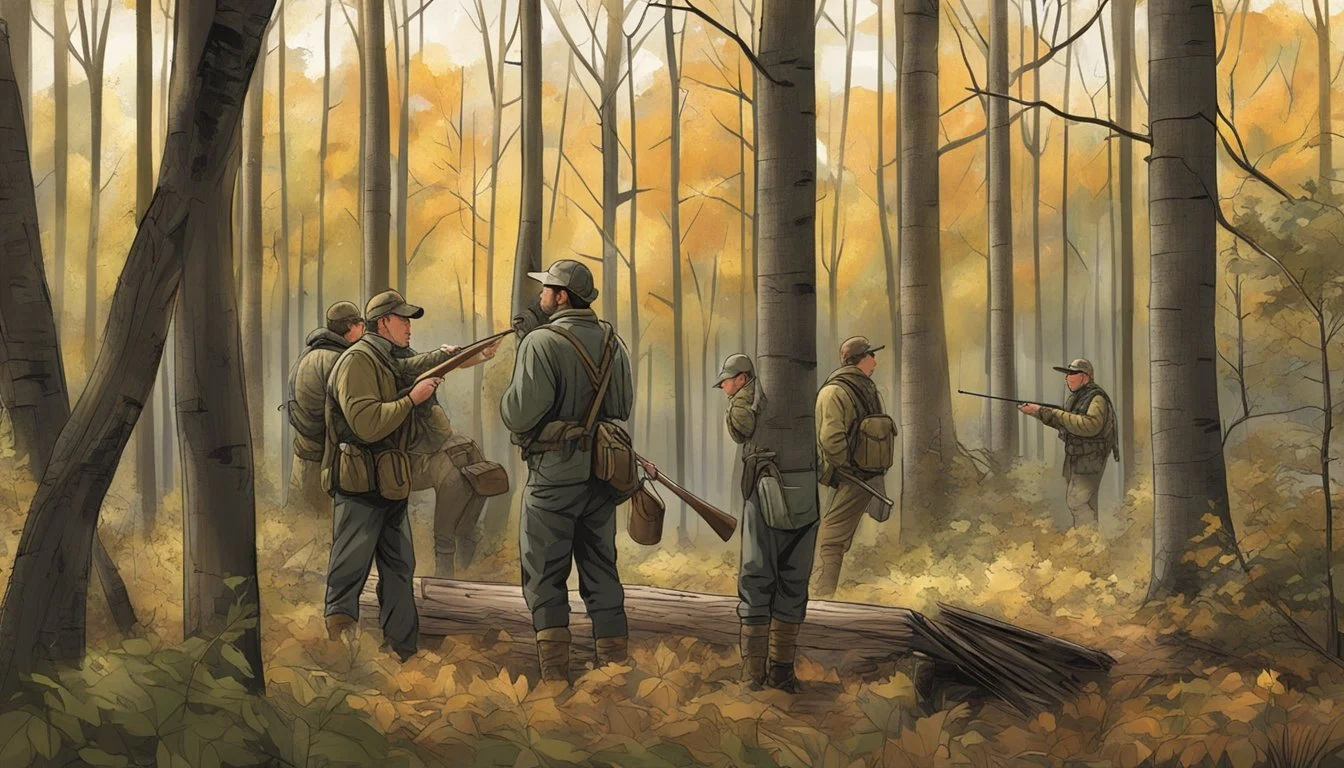Hunting Leases Delaware
Your Guide to Securing Prime Land
In the state of Delaware, hunting is a regulated activity that offers outdoor enthusiasts an opportunity to engage with the state's diverse wildlife. Despite Delaware's smaller size in comparison to other states, it boasts a surprisingly rich array of game species that draw hunters from inside and outside its borders. Seasonal hunting for various large and small game is facilitated through both private and public lands, with the former often made available through leasing arrangements.
Hunting leases in Delaware are contractual agreements that provide hunters with the right to hunt on private land for a specified period. These leases are beneficial for landowners who wish to earn income from their property and for hunters looking for controlled environments with potentially better management of the wildlife populations. The leasing process ensures fair use, incorporates legal stipulations to safeguard both parties' interests, and outlines specific hunting rights to prevent conflicts.
The Division of Fish and Wildlife manages multiple public wildlife areas in Delaware which equates to roughly 68,000 acres. These areas are maintained not only for the purpose of conservation but also to provide hunting and outdoor recreational opportunities. Whether through public or private lands, hunters in Delaware can experience a variety of hunting types including big game and small game, ensuring a comprehensive hunting experience within the state.
Understanding Hunting Leases
Hunting leases are a mechanism that allows hunters to gain access to private land for hunting, while landowners can benefit from an additional income stream. These agreements specify the terms under which the hunting activities can occur, including duration and type of game.
Types of Leases
Annual Leases: These agreements provide hunting rights for an entire season or year.
Short-term Leases: Ideal for specific hunting expeditions, often lasting a few days to several weeks.
Exclusive Leases: They grant a single party exclusive hunting rights to the property.
Non-exclusive Leases: Multiple parties may have access to the land at different times.
Benefits of Leasing Land
Financial Incentive for Landowners: Renting out hunting property can generate significant revenue.
Wildlife Management: Leases enable landowners to control who hunts on their property, contributing to effective wildlife management.
Enhanced Hunting Experience: Hunters receive the privilege of access to private hunting land that may offer better game opportunities.
Legal Aspects of Hunting Leases in Delaware
When engaging in hunting activities on leased land in Delaware, it is essential for individuals to understand the legal requirements set forth by the state. These encompass obtaining the proper hunting licenses and adhering to specific state regulations and rules. The Delaware Department of Natural Resources and Environmental Control (DNREC) plays a pivotal role in the establishment and enforcement of these regulations.
Hunting License Requirements
In Delaware, anyone wishing to hunt on leased lands must possess a valid hunting license. The type of license required may vary based on the hunter's age, residency status, and the game they intend to pursue. The following are key points regarding licensing:
Resident Hunters: Individuals who have resided in Delaware for at least one year before applying for a license are eligible for resident licensing.
Non-resident Hunters: Out-of-state hunters must purchase a non-resident license. Special permits may also be necessary for certain game species.
Licenses can be obtained through the DNREC website, approved licensing agents, or at DNREC offices. Specific licenses might be needed for deer hunting, which is a popular activity in Delaware.
State Regulations and Rules
Delaware has precise regulations that govern hunting on both public and private lands, including leased areas. They are designed to sustain wildlife populations and ensure the safety of all individuals involved. Any breach of these regulations can result in significant penalties, including fines and revocation of hunting privileges. Key rules include:
Season Dates: Hunters should strictly follow assigned season dates for various game species.
Bag Limits: There are established daily and seasonal bag limits that hunters must not exceed.
Hunting Methods: The use of certain types of weapons and ammunition is regulated. For example, it's prohibited to hunt with an illegal weapon or hunt from a motor vehicle.
The DNREC provides comprehensive guidelines and updates on such regulations which should be reviewed each season for any changes that might affect hunting lease arrangements.
Where to Find Hunting Land for Lease
Securing a spot for hunting in Delaware involves knowing where to look for both private and public hunting lands that offer lease options. This ensures a tailored hunting experience, whether focused on large or small game, in the abundant lands available within the state.
Private Land Options
In Delaware, particularly in Sussex County, hunters have the opportunity to lease private hunting lands that often boast a mix of hardwoods and pines. They can secure yearly leases for parcels such as a 32-acre land in Sussex County, which may provide features like mixed woods and ponds, enhancing the hunting experience. These private lands are most commonly leased directly from the landowners or through hunting websites that connect hunters with available properties. Listings may include specifications on allowed game, acreage, and lease terms.
Public Hunting Grounds
The State of Delaware offers public hunting lands where leases can sometimes be obtained. While public land is often accessible for hunting without the need for a private lease, some public areas might offer exclusive sections for lease, providing a more isolated and controlled environment. Hunters looking for public hunting grounds in Delaware can find various options through state-managed resources or designated hunting websites that filter searches by location and type of hunting land available.
Wildlife and Game Management
In Delaware, wildlife and game management efforts intertwine with hunting leases, providing hunters with various opportunities while prioritizing species conservation and population control.
Species Available for Hunting
Delaware offers a diverse range of species for hunters on public and private lands. These species include:
Big Game: The white-tailed deer is the most prominent species available for hunting.
Small Game: Hunters can pursue species such as rabbit and the ring-necked pheasant.
Upland Bird: Wild turkey hunting is a favored spring activity.
Waterfowl: Duck species, including sea ducks, are available during designated seasons.
Furbearers: Coyotes can be hunted, although they are less common in Delaware than in other states.
While elk are not native to Delaware and thus not on the list, the state's management strategies ensure a balanced ecosystem for the species that are present.
Population Control and Conservation
Delaware's Department of Natural Resources and Environmental Control (DNREC) plays a pivotal role in wildlife management. They implement rules such as deer carcass tagging and managed hunts to aid in population control. These measures are crucial for:
Maintaining ecological balance.
Mitigating human-wildlife conflicts, especially in urban areas.
Supporting species' long-term viability through conservation efforts.
The state also encourages participation in programs like Delaware Hunters Against Hunger to contribute to the community while managing wildlife populations. Hunters with disabilities are provided access, and the DNREC carries out waterfowl surveys to inform conservation status and hunting quotas.
Seasons and Timing
In Delaware, hunting seasons are carefully regulated throughout the year. They provide a structured timeline for hunters to follow, ensuring not only the safety of participants but also the conservation of wildlife.
Understanding Hunting Seasons
Hunting seasons in Delaware typically commence in September and continue until early February of the next year. However, the exact time frames for hunting vary by species and the method of take. Deer season, one of the state's longest, spans approximately five months, allowing ample opportunity for hunters. Delaware mandates that these seasons occur in a way that maintains ecological balance while giving hunters sufficient time in the field.
Hunting Season Start: September
Hunting Season End: Early February
This schedule is designed to maximize the state's wildlife management objectives.
Special Hunting Days
Delaware recognizes Special Hunting Days which may fall outside of the regular seasons. For instance, Sunday hunting is permitted on a limited number of days throughout the deer season. The state designates these specific instances to enhance hunting opportunities while adhering to its wildlife preservation goals. Hunters must be mindful of the following:
Sunday Hunting: Limited days available
The Delaware Division of Fish and Wildlife releases annual updates on season dates, including any adjustments to Sunday hunting or other special circumstances. Hunters should consult the latest information to stay compliant with regulations.
Hunting Practices in Delaware
Hunters in Delaware utilize a range of effective techniques tailored to the local terrain and wildlife patterns. These practices are designed to maximize the hunting experience while adhering to state regulations.
Use of Deer Stands and Blinds
Hunters in Delaware often employ deer stands and blinds to enhance their chances of a successful hunt. Deer stands provide an elevated vantage point, reducing the hunter's scent on ground level and increasing visibility. There are both permanent and portable varieties:
Permanent stands are typically constructed from wood.
Portable stands can be moved and set up as required by hunting conditions.
Blinds offer concealment at ground level and can be especially effective in areas with less tree cover. They come in various forms, including pop-up and camouflage-netted structures.
Duck Hunting Techniques
Duck hunting in Delaware requires a blend of skill, patience, and the right equipment. Auditory lures such as duck calls and visual decoys are used to attract ducks to a specific location. Here are common techniques:
Setting up decoy spreads in the water to mimic resting ducks.
Using calls to replicate duck sounds and entice them within shooting range.
Responsible hunters ensure that they are well-versed in identification to avoid non-target species and abide by designated hunting seasons for various duck species.
Additional Hunting Activities
Delaware offers a variety of outdoor activities for enthusiasts. The state not only provides ample hunting opportunities but also allows for combined experiences where fishing and hunting meet, especially on lands designated for conservation and recreation.
Fishing and Hunting Combinations
Delaware's varied landscape includes spaces where individuals can engage in both fishing and hunting, maximizing their outdoor experience. Public lands, including state wildlife areas, often have water bodies that host freshwater species, allowing for a dual-sport outing in a single trip. Regulations for these activities are usually provided by the Delaware Department of Natural Resources and Environmental Control (DNREC).
Hunting on National Wildlife Refuges
National wildlife refuges in Delaware, such as Bombay Hook and Prime Hook, have been established with conservation objectives that also support hunting activities during certain seasons. These refuges provide hunters with unique opportunities to pursue game in pristine environments, following specific guidelines aimed at maintaining the ecological balance.
Bombay Hook: Offers waterfowl and deer hunting seasons.
Prime Hook: Known for migratory bird hunting, offering different seasons for waterfowl.
Hunters must adhere to the regulations set forth by the U.S. Fish and Wildlife Service when planning their activities in these areas.




